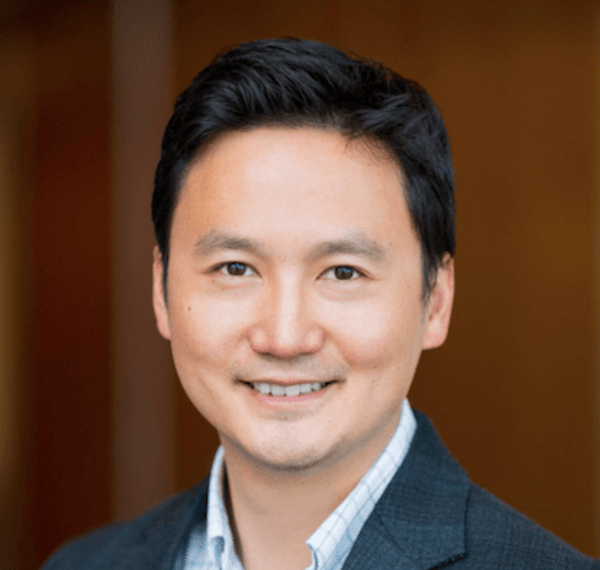
David Wang is Chief Innovation Officer at Wilson Sonsini, a firm that has been involved in plenty of pioneering legal tech projects. Artificial Lawyer asked him about his approach to innovation and legal tech. He summed it up in one phrase: ‘Aim high and articulate.’
So, if we are going to articulate this, let’s start with: ‘Why?’
‘We innovate to improve our business, and for me the most important discussion around tech and innovation is whether you are augmenting the revenue generation of a law firm,’ he explained.
It’s hard to argue with that. If all that software, if all that rethinking of processes, or better use of talent, doesn’t ultimately make the business more successful, if it doesn’t generate an increase in revenue – or at least support such an increase – then what is it all for?
The phrase ‘augmenting revenue generation’ also suggests that it doesn’t have to be as simple as X tech product makes Y amount of extra money, but rather that the tech, the process, the better use of talent, combines to improve the way the lawyers service their clients, leading in the final analysis to supporting income growth.
Maybe that growth is created by higher demand for that firm’s services, or innovation has enabled new types of legal provision? Maybe the firm is now just easier to work with? It’s faster perhaps and its delivery is more effective – it’s just better at doing what clients want.
And if it’s not for that, then what is it all for? Law firms are businesses and the inhouse teams are business units of enterprises backed by shareholders, who in turn are hoping for a return on investment. It’s a long value chain, and legal tech and innovation are threaded through it.
‘If you look at other industries, companies use tech to facilitate the way they make money,’ he pointed out, and added that this could also manifest itself by improving the ‘stickiness’ with the clients or other business goals. But meeting a business goal, i.e. something that will show up in the annual financial report, is key.
‘I’ve talked to so many law firms [about this subject] and the conversation often starts with cost reduction, or it’s about developing internal metrics. It’s often just a back-end business focus. Maybe that’s because people don’t think it’s possible to augment revenue generation [with tech and innovation],’ he noted.

Wang (above) then stressed that we need to be ambitious in our aspirations for legal tech’s impact.
He then mentioned by way of example, SpaceX, the Elon Musk company that is building the future of commercial space travel. Wang noted that although most of what SpaceX does is placing satellites in orbit, i.e. fairly well-travelled territory, the way that Musk has captured the space industry’s imagination is by stating that the ultimate aim is to go to Mars. Now, Mars may not be everyone’s cup of tea, but the space sector clients are interested in such an idea.
Beyond the themes of human exploration and the future of mankind there are some basic business issues: extending space travel means more demand for the space industry as a whole. In short, aiming high is not just a fanciful pipedream, it’s setting out long-term goals that genuinely appeal to the client base and make them want to do business with you. Ultimately, they want to come along with you for the journey.
Wang observed that the same follows for legal tech and innovation.
‘You’ve got to start with something that is compelling in order to move the other stuff that is static. The value proposition has to be compelling,’ he said.
I.e. telling the management board of a firm that they should invest in legal tech and build an innovation team because it might provide some additional operational data, or perhaps cut some marginal costs around document production, is not really selling it to the people who hold the purse strings. There’s just not enough motivation there to inspire real change.
This site then asked: how do you get this across?
Wang acknowledged that it’s not easy. ‘It’s the ‘how’ that people can’t articulate. Not so much the what,’ he said.
‘We should be asking: how do we get better results, how do we make things faster, easier, more predictable? Then overlay this with client demands,’ Wang explained.
But do the clients know what they want in terms of law firm innovation?
‘It’s not incumbent on the customers to know what they want, but they will know if you show them,’ he stated, echoing the mantra of Apple’s co-founder, Steve Jobs, a pioneer who never had much time for customer surveys and preferred to create things he knew they’d want (and nine out of ten times he was right…)
Of course, the challenge here is leadership. If you want a Jobsian approach then you need leaders with a vision who are happy to tackle the hard problems of getting to where things need to be.
Is that kind of desire within most law firms?
‘You have to embrace the trying of something new, you have to embrace the difficulties of that. You need to believe a better world is possible,’ he stated.
‘The question is: who will be successful in trudging along this hard road and who has the grit to absorb the failures to get to the massive prize at the end?’ he concluded.
Again, for this site, it all comes back down to leadership. So, what will help the leadership teams to tune into the opportunity, to make them believe the investment in innovation and new ways of doing things is worth it?
For Wang, it all comes right back to his first point, i.e. law firms are businesses at the end of the day, so you need a business argument.
‘There will always be risks, but I believe in market forces. I have to believe the clients pay [for what we provide] because there is market value in what we do,’ he noted.
‘The desire for change among the client base is there, they also face business pressures,’ he added, although Wang is open about the fact that the clients are sometimes ‘unaware of what to ask for’.
Again, this comes back to Jobs, i.e. sometimes you just have to lead in a certain direction because you believe you are right – and maybe that is really at the heart of all innovation, or as Wang put it: ‘Aim high and articulate.’
—
Legal Innovators California – Conference – San Francisco – June 9
Come along to Legal Innovators California, where David Wang and many other experts in the field will be speaking.
Details: Thursday, June 9, at Bespoke at Westfield, 845 Market Street, Suite 450, San Francisco. The conference will run all day, with panels, fireside chats, and presentations. There also will be plenty of time to network and to meet the many exhibitors.
Come along to learn, share and network at Legal Innovators California on June 9 in San Francisco.
For tickets please see here.
